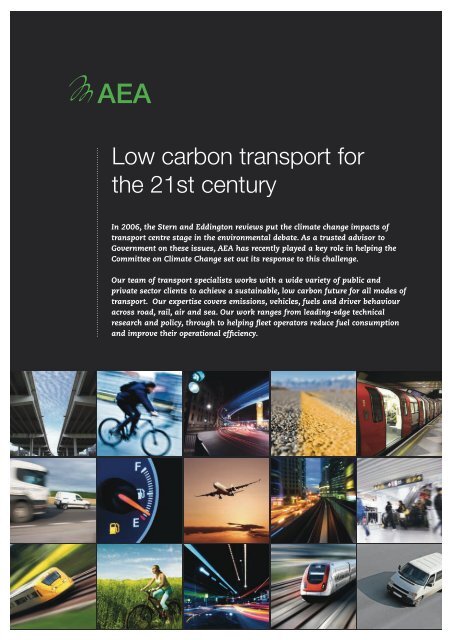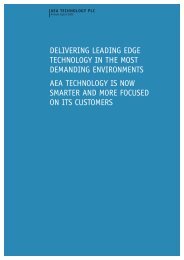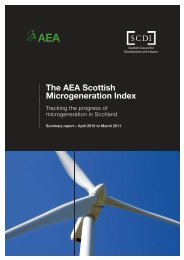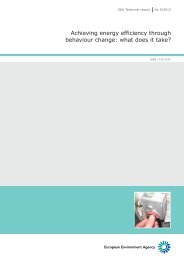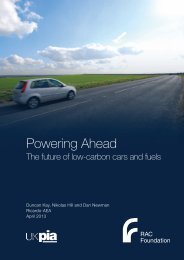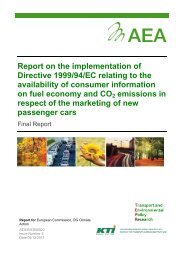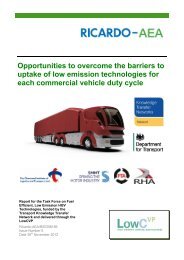Low carbon transport for the 21st century
Low carbon transport for the 21st century - Ricardo-AEA
Low carbon transport for the 21st century - Ricardo-AEA
- No tags were found...
Create successful ePaper yourself
Turn your PDF publications into a flip-book with our unique Google optimized e-Paper software.
<strong>Low</strong> <strong>carbon</strong> <strong>transport</strong> <strong>for</strong><strong>the</strong> <strong>21st</strong> <strong>century</strong>In 2006, <strong>the</strong> Stern and Eddington reviews put <strong>the</strong> climate change impacts of<strong>transport</strong> centre stage in <strong>the</strong> environmental debate. As a trusted advisor toGovernment on <strong>the</strong>se issues, AEA has recently played a key role in helping <strong>the</strong>Committee on Climate Change set out its response to this challenge.Our team of <strong>transport</strong> specialists works with a wide variety of public andprivate sector clients to achieve a sustainable, low <strong>carbon</strong> future <strong>for</strong> all modes of<strong>transport</strong>. Our expertise covers emissions, vehicles, fuels and driver behaviouracross road, rail, air and sea. Our work ranges from leading-edge technicalresearch and policy, through to helping fleet operators reduce fuel consumptionand improve <strong>the</strong>ir operational efficiency.
Best-in-class resource capabilityOur team of 40 sustainable <strong>transport</strong> consultantscombines leading-edge science and engineering expertisewith behaviour change and policy insight. The team hasextensive experience of <strong>the</strong> logistics sector and workingwith major stakeholders in <strong>the</strong> <strong>transport</strong> sector.Our continuing input to policy means that we have anin-depth understanding of current and future strategicenvironmental challenges facing <strong>the</strong> <strong>transport</strong> sector.At <strong>the</strong> operational level, we combine our extensive projectmanagement capability with unrivalled technical expertiseto achieve substantial cost and <strong>carbon</strong> reductions <strong>for</strong>our clients.Our technical capabilities include:• Measuring and modelling <strong>transport</strong> emissions(CO 2, SO 2, PM 10, NOx).• A deep understanding of low <strong>carbon</strong> <strong>transport</strong>technology (vehicles and fuels).• Practical, hands-on knowledge of freight and fleetbest practice, and improving operational efficiency.• Carbon footprint assessment and <strong>carbon</strong> life cycleanalysis.• Full-spectrum assessment of <strong>transport</strong> policy andstrategy, comprising environmental, economic, socialand health impacts.• Regulatory compliance and strategy.• Assessment of climate change impacts on <strong>transport</strong>infrastructure.Project examplesModelling emissions,comparing modesIn work <strong>for</strong> a major freight operator, AEA addressed <strong>the</strong>comparison between moving freight by road and rail,assessing not only <strong>the</strong> <strong>carbon</strong> emissions, but also <strong>the</strong>o<strong>the</strong>r air quality impacts and <strong>the</strong> safety recordsof each.More recent work has looked at <strong>the</strong> CO 2emissionsfrom short-haul flights versus high-speed rail links,in terms of passengers carried and per passengerkilometre.Cutting fuel use by UK plcAEA has managed <strong>the</strong> implementation of <strong>the</strong>Government’s Safe And Fuel Efficient Driver trainingprogramme (SAFED), first <strong>for</strong> HGVs and currently<strong>for</strong> light commercial vehicles (LCVs), overseeing <strong>the</strong>organisation and accreditation of a national network oftrainers. So far, over 16,000 drivers have been trained,generating immediate and significant fuel savings <strong>for</strong>business in addition to those that can be achievedthrough technology.Robust monitoring and management of fuel is anessential first step to realising savings. AEA combinesits industry knowledge and organisational capacity tohelp companies devise and implement strategies tosubstantially reduce fuel consumption.Filling <strong>the</strong> tank – alternative fuelsAEA played a key role in <strong>the</strong> Gallagher review on <strong>the</strong>indirect effects of biofuels.O<strong>the</strong>r projects have examined <strong>the</strong> potential <strong>for</strong> usinghydrogen and biodiesel on Britain’s railways, carrying outa wide-ranging feasibility study into <strong>the</strong> use of hydrogen inroad <strong>transport</strong> and organising an extensive trial of biofuelsin a UK public-sector vehicle fleet.Driving <strong>the</strong> future –vehicle technologyIn recent work <strong>for</strong> Government, AEA examined <strong>the</strong> fulllife cycle cost-benefit ratio and cost of ownership <strong>for</strong>hybrid electric and battery-electric vehicles, includingbuses. For a rail industry client, AEA assessed <strong>the</strong>technological options <strong>for</strong> improving <strong>the</strong> efficiency ofrolling stock, combined with whole-life environmentalcost models.Understanding <strong>the</strong> wider impactsof <strong>transport</strong>AEA has undertaken a number of studies <strong>for</strong> publicand private sector clients to understand <strong>the</strong> widerimpacts of <strong>transport</strong> activities. For example, a recentGovernment project involved modelling <strong>the</strong> impacts ofcurrent and future rail infrastructure development on airquality, greenhouse gas emissions and noise.For more in<strong>for</strong>mation, please contact Jerry Izard, Client Director, Transportt: +44 (0) 870 190 2639 e: jerry.izard@aeat.co.uk w: www.aeat.com2/24/Mar09


